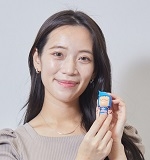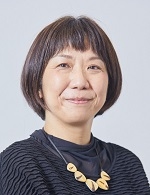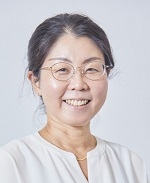Living Together with Japanese Language <1>
Interview with Lead Actor Fonchi and the Production Team of "ひきだすにほんご Activate Your Japanese!"
What Activates Our Communications (Part 1)
December 28, 2022
[Special Feature 077]
Special Feature: "Living Together with Japanese Language" (for more on special features, click
here)
The Japan Foundation (JF) and NHK Educational Corporation co-produced "ひきだすにほんご Activate Your Japanese!" which has been broadcast and distributed online since February 2022. The main drama segment of the program, "スアン日本へ行く!/Xuan Tackles Japan!" is a language learning program in which the main character, Xuan, who has come to Japan from Vietnam, improves her communication skills by learning strategies*1 for effective communication through her interactions with the people that she meets in her daily life and work. The story depicts Xuan and the people around her learning and growing together, and is peppered with tips for both people studying Japanese and native speakers to live together using Japanese as a communication tool.
We interviewed actor Ms. Fonchi, who played the role of Xuan, Ms. Mizutani Yoko, producer of the program, and Ms. Kikuoka Yuka, a senior lecturer at the Japan Foundation Japanese-Language Institute, Urawa, who supervised the production, about their thoughts on the program and stories from behind the scenes during production.
*There are several statements made during the interview that reveal parts of the storyline of the program. Please be careful if you are going to watch the program in the future.
"Xuan Tackles Japan!"―Character Correlations in the Program
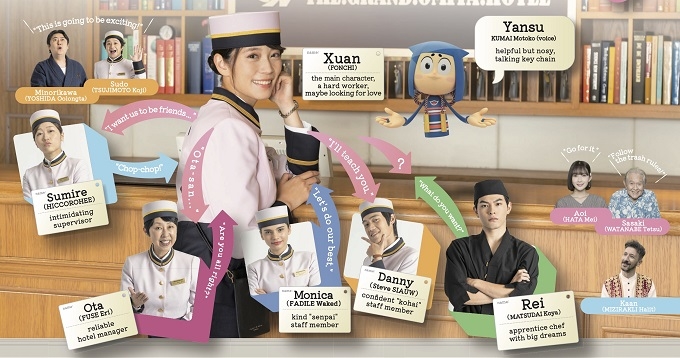
For more information on the program, please check the website of the Japan Foundation Japanese-Language Institute, Urawa.
https://www.jpf.go.jp/e/urawa/e_rsorcs/hikidasu.html
We hope you enjoy the program as well as the interview.
You can watch "ひきだすにほんご Activate Your Japanese!" on NHK WORLD-JAPAN.
https://www3.nhk.or.jp/nhkworld/en/tv/activateyourjapanese/
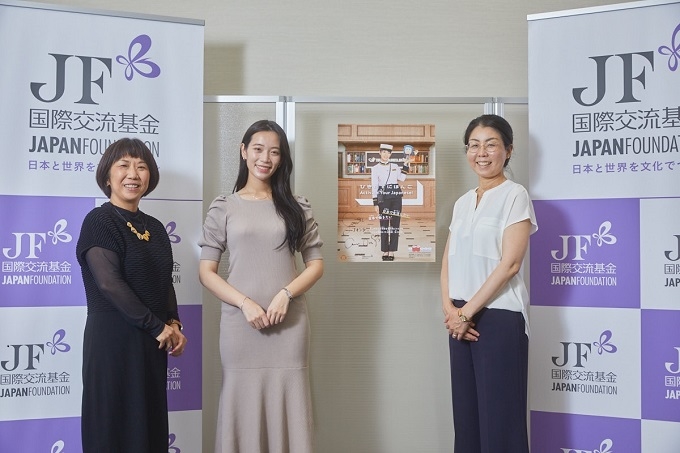
Interviewees
Mizutani Yoko (left in the picture; Senior Director, Content Production Development, Language Learning, NHK Educational Corporation)
Fonchi (center; Actor in "Xuan Tackles Japan!" who plays the role of Xuan, the main character)
Kikuoka Yuka (right; Senior Lecturer, The Japan Foundation Japanese-Language Institute, Urawa)
- ── "ひきだすにほんご Activate Your Japanese!" began airing and streaming on February 28. Did you receive any feedback from your family and friends?
- Fonchi:
I got a lot of feedback from them. The most common thing people said was that 'Yansu' (the talking key chain) is cute. I thought, "Yansu gets more credit than me?!" (laughs). But since Yansu is the program's mascot, I am happy that people are paying attention to them.
I was born and raised in Japan and speak Japanese without any problems, so people around me told me very much that it felt unnatural when I spoke in limited Japanese. Xuan came from Vietnam to work in Japan with limited Japanese, so it was quite difficult to act from her point of view of not being able to speak the language well, but thanks to the help of various people, I somehow managed.
- ── Ms. Mizutani, you have worked on various language learning programs in the past, so what do you think about the reputation of this program among your production colleagues?
- Mizutani:
If I may say so myself, the reputation is very good (laughs). It is not a typical language learning program. The drama in and of itself is enjoyable to watch. People like the fact that they can enjoy the story without having to feel the pressure of learning. The overall tone is also organized and easy to watch.
It is currently being broadcast on NHK WORLD-JAPAN, and we have already received feedback from Malaysia, the United Kingdom, Canada, and so many other places. I am sure there are many more people in other countries who have watched it that I am unaware of, but we have received many different opinions on the program. People say that the nuances of the Kansai dialect were interesting, or that the approach to learning Japanese through drama was innovative and fun. Overall, many say they enjoy it.
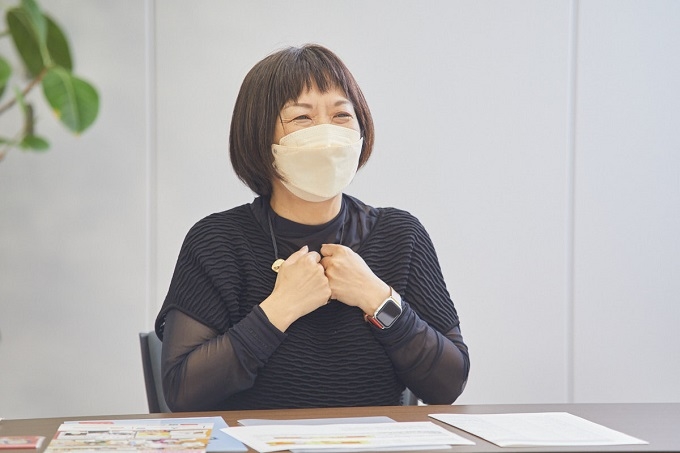 Mizutani Yoko, production producer of "ひきだすにほんご Activate Your Japanese!" She gets a sense for the positive response from all over the world
Mizutani Yoko, production producer of "ひきだすにほんご Activate Your Japanese!" She gets a sense for the positive response from all over the world - Kikuoka:
Having fun is important, isn't it?
To our surprise, we received a positive response from Japanese language teachers in France. Recently, there have been some online gatherings for discussions among Japanese language teachers, and in such places, you can find a room to watch "ひきだすにほんご Activate Your Japanese!" - Fonchi: I want to participate, too (laughs). I would like to hear what viewers like about the program, and stuff.
- Kikuoka: Actually, I participated in one of the gatherings that Japanese language teachers in France were hosting last time. What made me very happy there was the comment that even students at the introductory level could enjoy watching it. They can enjoy the program and mumble and imitate the parts of Xuan's lines that they recognize.
- Mizutani: I love the fact that beginners are enjoying it too.
- ── The main character of this drama, Xuan, is a girl from Vietnam who came to Japan to work and is trying her best to study Japanese and work hard. What is playing the role of Xuan like for you?
- Fonchi:
I don't think I myself am that close to Xuan, but I have friends and a lot of acquaintances like Xuan in my life. There is a Vietnamese girl working at a convenience store in my neighborhood and we recently became friends. When I showed her my loyalty card, my name was displayed at the cash register, so she noticed that I am Vietnamese and asked me, "Hey, are you Vietnamese? Your Japanese is very good. Please be my teacher." After that, we started talking a lot. When I heard that she came to Japan from Vietnam less than a year ago and was working hard in Japan to send money to her parents living over there, I thought, "That sounds like Xuan."
I have played the role of a foreign worker in other dramas, I have heard that the number of foreign workers is increasing, not only those from Vietnam. Also, there are many people working in Japan to send money to their families in their home countries or to save up for their dreams for the future. I was born and raised in Japan, but as someone of foreign descent, I am not exactly a stranger to how people coming to Japan for the first time feel, and I would like to help them, even if only a little. So, I actually do teach the convenience store clerk one or two Japanese words once in a while.
Through this program, I feel more strongly than before that I should try to treat such people around me with kindness and warmth. I think it is very difficult to come to work in a foreign country, so I try to support such people and treat them with compassion if I come across them. Through Xuan, I have come to feel more and more that just talking to them warmly in Japanese, not in difficult words but in simple words, can help them and encourage them to do their best. I hope that people who don't know about people like Xuan will feel the same way through this drama.
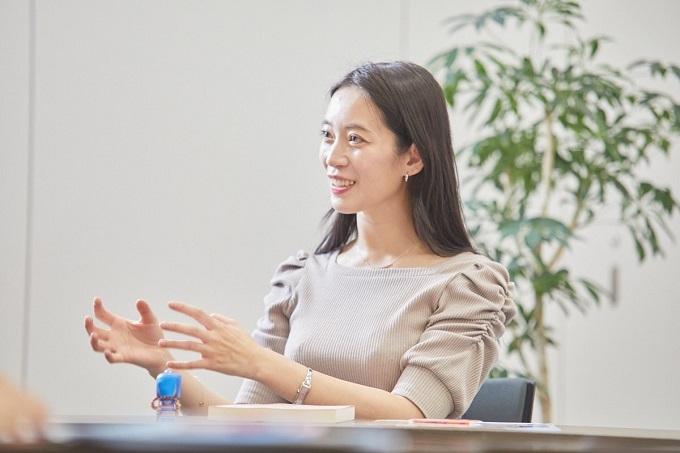 Fonchi says that playing Xuan has changed the way she treats foreigners living in Japan
Fonchi says that playing Xuan has changed the way she treats foreigners living in Japan At the time, I thought I was speaking quite slowly, but when I watched it on air, I realized that I may have been speaking a little too fast, so there are a lot of things I could've done better. I wish that I could have felt closer to Xuan personally, but I also felt that her feelings and thoughts were something that only I, with so many people like that around me, could understand, so I played the role with a mixture of emotions.
I thought that there would definitely be a lot of things that foreigners wouldn't understand when talking with a native speaker of Japanese, so I decided to try to be a little more considerate of such a person.
- ── There are many fascinating characters surrounding Xuan in the drama. Was there anyone in particular who impressed you?
- Fonchi:
There are too many of them to count (laughs). Everyone was a strong character of the MVP level, especially Ms. Ota, the hotel manager who was close to Xuan, played by Ms. Fuse Eri. We usually had many meetings together. When she spoke to Xuan, she was very deliberate in her speech, and delivered each word slowly. If there are a lot of people like Ms. Ota, more foreigners will be able to learn Japanese. I would like to be like Ms. Ota myself. I want to talk to them slowly, teach them things that they don't understand with patience, and also tell them what is unacceptable. If there were more people in society who could do that in a well-balanced manner, I think there would be more people who would come to work in Japan with more peace of mind.
Danny and Monica are also, well, strong characters (laughs). Danny in particular, played by Mr. Steve Siauw, and Steve himself is really just like that in general. It's like he was just being himself rather than acting. The director seemed to think Danny was funny, but I was having so much fun filming with him that I was struggling to hold back my laughter, thinking that this Danny character was so real, that there are actually people like him in real life.
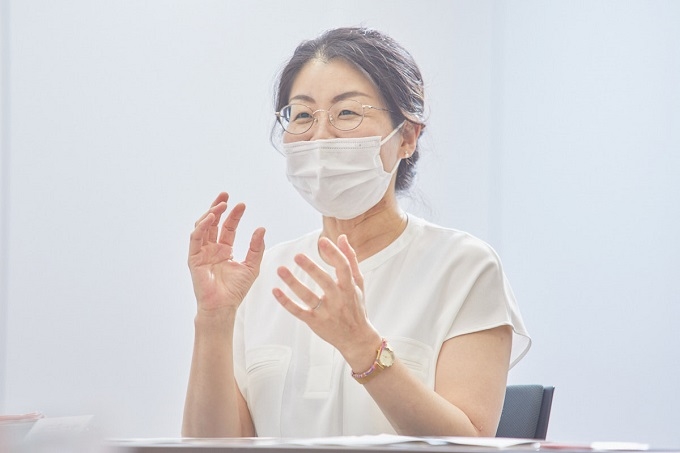 Kikuoka Yuka, Senior Lecturer at the Japan Foundation Japanese-Language Institute, Urawa, says she hopes Japanese people in the community will watch the program
Kikuoka Yuka, Senior Lecturer at the Japan Foundation Japanese-Language Institute, Urawa, says she hopes Japanese people in the community will watch the program In this program, I wanted to convey the message that the host society, which welcomes foreigners, should also change together with them. It is very idealistic to be able to communicate considerately like Ms. Ota, or to change through interactions with Xuan, like another character Rei did. However, I thought it may be okay for there to be people like Mr. Sasaki who cannot change easily. It's hard to explain, but I thought that even if they couldn't change well, by continuing to be involved, they would get used to foreigners in a positive way, and there would be subtle changes that they wouldn't really see, and that would create a unique relationship of its own. I think that such clumsy relationship-building is evident in Mr. Sasaki's role, and I find it heartwarming; I really like him, and I think he teaches us the importance of continuing to be involved.
- ── The way that people like Mr. Sasaki and Rei, who grew up in Japan, speak Japanese as their mother tongue, and have lived in the Japanese community, change and grow through their involvement with Xuan is something that can be helpful to those receiving foreigners studying Japanese language. Were you conscious of native speakers in the audience from the production stage of the program?
- Mizutani:
That is exactly right. That was one of our aims. There are many different kinds of Japanese people. Everyone has his or her own way of interacting with foreigners. When we first decided on the plot, I think we spent a tremendous amount of time talking about what kind of professions and characters to include.
If you have too many characters, the story becomes scattered and confusing, so I had hoped that there would be some archetypal characters and that they would represent their worlds, and I feel that this has worked out beautifully.
I asked Mr. Sumida Takashi to direct the drama segment of the program, and as we made various adjustments at the end, he said, "I want to make it look like there really are people like that," and so it became a microcosm of Japan itself. So, I think viewers naturally began to feel, "Oh, there are people like this," and "This is how they deal with such situations." I believe this is the result of everyone, including Ms. Fonchi, playing their roles well. - ── It seems to be a rare case that a language-learning program targets native speakers of the language, or in the case of "ひきだすにほんご Activate Your Japanese!", native speakers of Japanese, as its audience. What was the motivation behind this bold choice?
- Mizutani: I thought it was a theme that could not be left out of the genre of Japanese language study. After all, words are a communication tool, so even if one side tries hard to convey something, if the receiving side rejects it or perceives it differently, the message will no longer exist. Communication is only possible when both sides strive for understanding. So we wanted to depict how both sides, not just the learners but also the people who accept the learners, need to be aware of the importance of mutual understanding.
- ── "Yansu" who watches over and helps Xuan is also an indispensable character. What was the goal of including them in the series?
- Kikuoka: Yansu's role was to share the thought process with the people watching the program when Xuan is thinking about a strategy. I also thought that when living in an unfamiliar place, it would be very helpful to have someone like Yansu to talk to, encourage you, and get involved in your learning. I think Yansu is a necessary guide for our growth, and for establishing our own position in a new place.
- Mizutani:
Actually, there is a very long history leading up to the creation of Yansu, and we had a hard time deciding on this character. It was really decided at the last minute.
Initially, we had the idea of visualizing a brainstorming session being held in the mind of the protagonist. When you study a foreign language, you have to think hard, sweating under your arms. You wonder what you should say next and how you should say it. In such a situation, you may think, "Isn't it bad to say this?" or "Shouldn't I say it this way?" I wanted to visually represent the conflict that was going on in the head of a foreign language speaker. It gradually evolved through discussions and gave birth to the character Yansu.
So now, Ms. Kikuoka has told us that Yansu is an encouraging presence, but at the same time, I think they are sort of an alter ego, the other you within yourself, or something like that. So Yansu didn't offer many answers to Xuan's concerns. I wanted to express the process of Xuan's struggle within herself, so this is how it turned out, and somehow it ended up looking very cute (laughs). - ── How was the visual for Yansu decided?
- Mizutani: The entire staff worked together to come up with the character.
- Kikuoka:
At first we were thinking of an animal character. But when we think about distributing it all over the world for people to see, there are surprisingly few animals that can be accepted anywhere without difficulty. So in the end, we agreed that animals were not the way to go.
In "Erin's Challenge! I Can Speak Japanese," a program created by the JF, there was a character called "Honigon," and the concept was that Honigon was not any specific animal or anything. I thought it would be nice to try that again this time, but I changed my orientation again and decided to go with something that felt more Japanese, which led me to Yansu. - Mizutani: Mr. Aoki Jun, the animation artist, finally put it into this form, and I was so happy when it was decided after I had been struggling with it for so long.
- ── The actual Yansu is just a key chain, but after it pops out of the form of a key chain and is ready to talk, it is a CG. Was it difficult to shoot while imagining Yansu was there?
- Fonchi:
All Yansu's scenes were very difficult (laughs). We had to make camera adjustments on the scale of millimeters. The scenes with Ms. Ota, Rei, and others were shot pretty quickly, but for a scene with Yansu, there would be a three-hour block on the call sheet. The camera operators and many other staff members were very detailed in adjusting the angles and heights. I also used scratches on the wall as markers for my line of sight and we needed to set those up in exact detail for each scene.
Yansu's movements are specifically choreographed; Yansu pops out, gets on my shoulder, gets on a chair, moves this way and that, etc., so you have to act while somehow imagining that a life-sized Yansu is there. The voice actor was there on the set to do the voice, but it was very difficult to talk to someone who was not right in front of you, and it was also very difficult to convey emotions.
When talking to Yansu, Xuan is often distressed, and in scenes like that, it was hard to get the timing right in my performance. - ── The fate of Yansu after episode 24 is left to the viewer's imagination, but what do you think the future has in store for the character, Ms. Fonchi?
- Fonchi:
We were actually talking about Yansu's future when we were shooting the final airport scene. I selfishly believe there will be a sequel to this drama. I think Yansu will go abroad with Rei and maybe find a companion there. Yansu will give the same kind of support to Rei overseas as they did to Xuan and come back to Xuan with their companion after a long time, and introduce their companion to her as well.
I am sure that Xuan will continue to work at the hotel during the time she is away from Yansu and will probably grow even more, but I believe that she will probably face more problems at a higher level of Japanese, and will continue to increase her Japanese skills with the help of Yansu. And I also thought up "Yanko" on my own, a character who is Yansu's companion who stops Yansu from getting out of control... I took the liberty of thinking that Yanko's color might be pink. Or maybe they'll wear some stylish flowers.
Yanko teaches the French language, tells us how French people speak and what kind of advice they give us, and teaches us about the culture and so on. If an additional element of comparing Japanese and foreign expressions were to be included, I think the world would expand even further. I might develop the concept for "Yanko" on my own, but I'll probably be told no by Mr. Aoki (laughs). - Mizutani: Actually, there was a talk of wanting to create a Yansu family. There was an idea that it would be cute if there was another character in a different color.
- Fonchi: If there is a sequel, I hope you will consider Yanko (laughs).
- *1 "Strategies" as used in language teaching refer to conscious actions taken to effectively achieve communication and learning objectives. In "ひきだすにほんご Activate Your Japanese!" we refer to the definition of strategies in the Common European Framework of Reference for Languages (CEFR: Learning, teaching, assessment), a shared framework for language teaching and learning in Europe. Based on this CEFR's idea, we define "strategies" as not only the "action" part but also the "thinking" part in which one judges the situation and consider how to act by leveraging their abilities and surrounding environment.
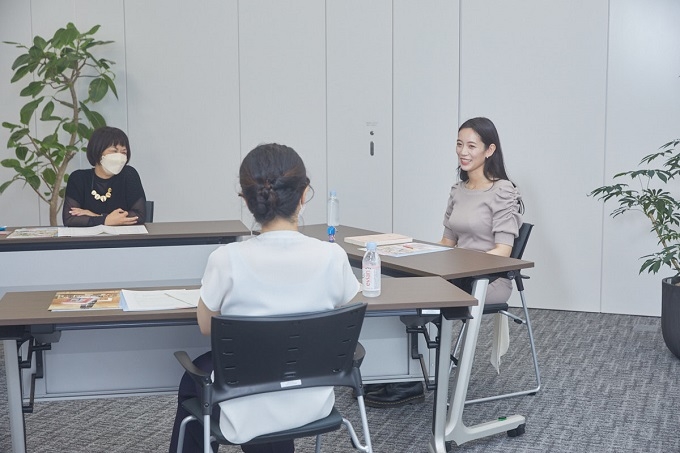
 Yansu appears when Xuan is in trouble and gives tips on how to solve her problems
Yansu appears when Xuan is in trouble and gives tips on how to solve her problems Continues to Interview with Lead Actor Fonchi and the Production Team of "ひきだすにほんご Activate Your Japanese!"
What Activates Our Communications(Part 2)
June 2022, Tokyo
Interview and text: Ishikawa Yui (Public Relations Department, The Japan Foundation)
Photo: Sasaki Maria
Related Articles
Back Issues
- 2025.11.14 Stories from Both Si…
- 2025.10.24 Dialogue through Ani…
- 2025.6. 9 Creating a World Tog…
- 2024.10.25 My Life in Japan, Li…
- 2024.5.24 The 50th Japan Found…
- 2024.5.24 The 50th Japan Found…
- 2024.5. 2 People-to-People Exc…
- 2024.5. 2 People-to-People Exc…
- 2023.12. 7 Movie Theaters aroun…
- 2023.6.16 The 49th Japan Found…


